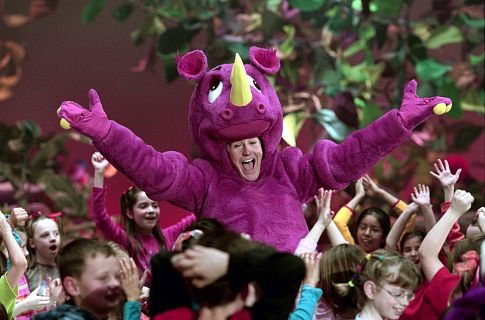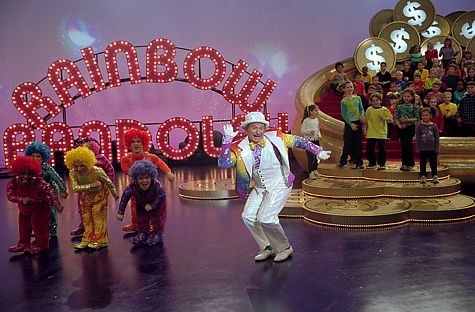

Making a satire on children's shows is almost redundant, because oftentimes they are so bad that they inadvertently make fun of themselves. Death to Smoochy is supposed to be a dark satire on a Barney/Teletubby-type show, but it lacks the wit necessary to make it a satire. The point is to how evil and corrupt the people behind so-called children's shows actually are. Their television persona is nothing more than a facade. More often than not, it is a little tiring and not that funny. At the beginning, agents bust popular host Rainbow Randolph Smiley (Robin Williams, A.I., Bicentennial Man) for accepting a bribe to put a specific child on the air. Smiley is a bitter drunk, probably insane, and definitely corrupt. When the network hires a replacement, it incenses him beyond belief. His replacement is Sheldon "Smoochy" Mopes (Ed Norton, The Score, Keeping the Faith), an innocent, naive man who dresses up as a large purple rhinoceros.
Death to Smoochy goes off in a couple directions. Smoochy's show proves wildly popular, which further ires Smiley. Smiley decides that the only way to get his own show back is to ruin Smoochy's name. This involves a number of elaborate plans that all go awry, and involve all sorts of strange things like cookies shaped like genitalia and a Nazi rally. Meanwhile, Mopes must learn to deal with the cutthroat world of production. His values clash with those of Nora Wells (Catherine Keener, Simpatico, Being John Malkovich), his producer. She wants product tie-ins, higher ratings, and more revenue, while Mopes wants to remain free of any sort of outside influence, and free to preach the values of family, friendship, and organic food. Mopes hires Burke (Danny DeVito, Heist, What's the Worst That Could Happen?) to represent him as an agent, but Burke has his own plans for Mopes. So Mopes must deal with the temptation to sell out.
DeVito (who also directed) and writer Adam Resnick (Lucky Numbers, Cabin Boy) fail to infuse any meaningful sense of humor in Death to Smoochy. Everything kind of plods along until the end. They write all of their characters with broad strokes, so nobody has any sense of depth or true personality. Smiley is psychotic. Wells is a bitch. Mopes is the innocent babe. There are some other supporting characters that are odd just so that they can be, including a dimwitted ex-boxer and his mafia-like family, and a dwarf. The movie never gets deeper than people acting mean towards each other. There is a romance between Wells and Mopes that literally appears out of nowhere and largely goes nowhere. It doesn't help that there is little chemistry between Norton and Keener, and even less opportunity for the audience to see why they like each other (the explanation is not worth it).
There is one surprise in this movie, and it is Robin Williams. In recent years, Williams wallowed in sappy, bad films. His trademark is a falsely emotional performance and ample opportunity for him to improvise. Smiley is much darker than all of Williams' recent roles, and it's a nice change to see him acting again. He still does have some opportunity to improvise, but it's thankfully limited. One cannot say the same about the other actors, who can (and often do) do much better. Done correctly, this would be a great role for Keener, who revels in playing strong, bitter women. The script hampers her here, with a sudden turn to the cheesy. The script also hampers Norton, who is usually a good actor. Mopes is so one-dimensional and overly happy that he becomes little more than a caricature, just as deep as the big purple rhino his character plays.